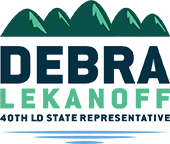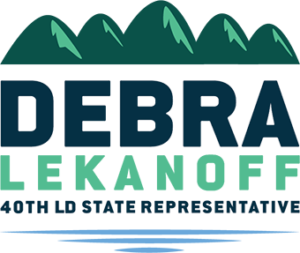Celebrating Indigenous Peoples Day on Marvelous Monday
Dear Friends,
As we commemorate Indigenous Peoples’ Day, I want to reaffirm my dedication to honoring the rich cultures, histories, and contributions of American Indian and Alaska Native peoples—the First Peoples of the lands we call home. This day offers not only an opportunity for celebration but also for education and reflection on the vital role Indigenous peoples play in our society, economy, and way of life in Washington State and across our nation.
I proudly support Governor Inslee’s Proclamation recognizing Native American Heritage Month and Native American Heritage Day in Washington State. This significant shift from Columbus Day acknowledges the complex history and cultural contributions of Native peoples. It is essential that we celebrate their resilience and honor the historical fact that they inhabited these lands long before European settlers arrived.
One of my primary motivations for seeking public office was to promote collaboration among local, tribal, and state governments in developing policies, regulations, and fiscal investments that benefit all our communities. Representing a district rich in diverse Native American cultures, I understand the importance of building strong partnerships that amplify Indigenous voices.

Photo Courtesy of Cathy Bremner
My legislative priorities include addressing the unique challenges faced by tribal communities, from improving healthcare access to advocating for the protection of natural resources. I firmly believe that policies should be informed by those most affected by them, which is why my office consistently engages with tribal leaders to ensure their perspectives and needs are central to our decision-making processes.
Our initiatives have included efforts to improve educational opportunities for Native students, acknowledging historical disparities and the importance of culturally relevant curricula. We have also promoted environmental stewardship, recognizing the deep connection Indigenous peoples have with the land and their crucial role in conserving natural resources. Additionally, I support economic development in tribal communities, recognizing the importance of economic diversification and its potential to benefit both tribal members and surrounding communities.
Some may suggest that my focus on Native issues is disproportionate. However, a closer examination of my political agenda reveals that I follow in the footsteps of many legislators, tribal leaders, and local and federal officials who have been committed to bringing our governing bodies together. For two decades, the late John Mccoy was the only Native American leader re elected year after year, who served in the Legislator. He was my mentor, who taught me that “words matter” and that a legislator must represent policies that benefit all people. By providing a pathway for legislators and tribal leaders to work together for the common good, we are building a stronger future for our great state.
My ultimate goal is to ensure that our government operates as a true partner to American Indian and Alaska Native communities. Through fostering collaboration, we can create a more equitable and sustainable future for all Washingtonians, rooted in respect and understanding for the rich cultural heritage of the lands we share.
Keep reading for more on this Fantastic Friday.
Rep. Debra Lekanoff
The Centennial Accord Celebrates 35 Years
This year marks the 35th anniversary of the Washington State and Tribal Centennial Accord, a landmark agreement established in 1989 between Washington State and its federally recognized American Indian tribes. The Accord acknowledges tribal sovereignty and lays the groundwork for a collaborative government-to-government relationship.
Governor Jay Inslee recently attended the 35th Annual Centennial Accord Meeting, hosted by the Suquamish Tribe. Reflecting on the occasion, Inslee emphasized the importance of respecting tribal sovereignty and treaty rights, noting the progress made through partnerships in areas such as environmental protection, public health, and economic development.

Photo Courtesy of Governor Inslee
The Centennial Accord reaffirms the commitment to a government-to-government relationship between the state and tribes, as established by gubernatorial proclamation on January 3, 1989. This relationship aims to enhance communication, facilitate issue resolution, and build trust through clearly defined implementation processes.
The Accord outlines responsibilities for both state and tribal parties to improve services for Indian and non-Indian populations alike. It encourages the development of specific agreements to address urgent issues and calls for educational efforts to promote understanding of the government-to-government relationship.
Accountability is a key aspect of the Accord, with state agencies required to align their policies with the government-to-government relationship and designate representatives to handle issues of mutual concern. Tribes are also expected to establish documented systems of accountability to ensure successful implementation of the relationship.
The Centennial Accord serves as a framework for ongoing collaboration between Washington State and its tribal nations. It emphasizes the importance of mutual respect, understanding, and cooperation in addressing shared challenges and opportunities. As we commemorate this milestone, the Accord continues to guide efforts towards building a more equitable and sustainable future for all communities across Washington State.
Honoring Indigenous Legacy in Washington State
The Washington State Legislature has passed the Billy Frank Jr. Statue Bill, which will replace the statue of Marcus Whitman with one of Billy Frank Jr. in the National Statuary Hall in Washington, D.C. This decision reflects a growing recognition of Indigenous contributions to Washington’s history and the need to celebrate voices that have often been marginalized.
Billy Frank Jr., a member of the Nisqually Tribe, was a renowned advocate for Native American fishing rights and environmental protection. His efforts led to landmark agreements that transformed fishery management in the region.

Photo Courtesy of the Washington State Standard
I want to emphasize that this change is not merely symbolic, but a commitment to honoring Indigenous heritage and recognizing the struggles for justice and sovereignty. House Minority Leader J.T. Wilcox noted that Frank’s story represents resilience and dedication to Indigenous rights, resonating deeply with the state’s history.
Lieutenant Governor Denny Heck stated that this change is about redefining Washington’s values and celebrating Frank’s contributions as an essential part of the state’s history. Additionally, Willie Frank Jr., son of Billy Frank Jr. and a respected leader in the Nisqually community, shared his appreciation for this recognition, saying, “My father dedicated his life to fighting for the rights of our people and for the environment we all share. This honor reaffirms the importance of respecting our history and the legacy passed down through generations of indigenous leaders.”
Watch the most recent video that tells the story.

Billy Frank Jr.
The statue, designed by Seattle artist Haiying Wu, will depict Billy Frank Jr. overlooking water with salmon at his feet, symbolizing his work on fishing rights and environmental conservation. The full-scale, 9-foot-tall bronze statue is expected to be installed in the U.S. Capitol in 2025, with another copy to be displayed in the Legislative Building in Olympia.
This change encourages dialogue about the history and contributions of Native American communities in Washington State, fostering a more inclusive narrative that recognizes the diversity of the state’s heritage.
Honoring Abigail Echohawk
Abigail Echo-Hawk has emerged as a prominent advocate for Indigenous peoples, particularly in the realm of public health and social justice. As the Executive Vice President of the Seattle Indian Health Board and Director of the Urban Indian Health Institute, she has made significant contributions to improving health outcomes for American Indians and Alaska Natives.
During the COVID-19 pandemic, Echo-Hawk’s leadership led to a 98% vaccination rate among American Indians and Alaska Natives in King County, Washington. This achievement underscores her dedication to ensuring the well-being of Indigenous communities during a critical time.
Echo-Hawk has been a vocal advocate for addressing the crisis of missing and murdered Indigenous women and girls (MMIWG). In 2018, she co-authored a report that brought national attention to the data issues surrounding MMIWG cases in urban areas across the United States. Her efforts include raising awareness, advocating for policy reforms, and improving data collection to address systemic issues contributing to violence against Indigenous women.
In 2020, when the Seattle Indian Health Board received body bags instead of COVID-19 supplies, Echo-Hawk responded by creating a ribbon dress from the materials, symbolizing resilience and drawing attention to both the pandemic’s impact and historical injustices faced by Indigenous communities.
Echo-Hawk continues to address systemic gaps in national policies related to Indigenous communities through data-driven advocacy. Her work focuses on transforming data into a force for change, ensuring that the experiences of Indigenous peoples are represented in policy discussions.
As a member of the Pawnee Nation of Oklahoma, Echo-Hawk’s efforts extend beyond her professional roles. She serves on various scientific research committees and volunteers with organizations focused on eliminating health disparities and advocating for women of color.
Empowering Future Generations
I am proud to share that in 2024, the state Senate unanimously passed House Bill 1879, which I sponsored. This bill officially renames the “Since Time Immemorial” curriculum to “The John McCoy (lulilaš) Since Time Immemorial curriculum.”
It’s now on its way to Governor Jay Inslee for his signature.
This legislation is close to my heart as it honors the foundational work of my late colleague, Senator John McCoy. John was a tireless advocate for Indigenous education and rights, and his efforts in 2005 laid the groundwork for implementing this crucial curriculum across our state.

Governor Inslee and the Great Senator John McCoy
I’m particularly excited that this renaming makes state history by incorporating John’s traditional Lushootseed name, lulilaš. It’s the first time a Lushootseed word will be enshrined in Washington law, marking a significant step in recognizing and preserving our Indigenous languages and cultures.
As a strong advocate for American Indian and Alaska Native rights and education, I believe this bill is paramount in addressing the gap in knowledge about Native American history, culture, and the complexities of tribal sovereignty. Many of our young people graduate without a comprehensive understanding of these crucial aspects of our state’s heritage.
This isn’t just an educational mandate; it’s an investment in our future. By teaching all students about Native American sovereignty and culture, we’re laying the foundation for respect and understanding. We’re ensuring that they grasp the complexities of our shared past and present.
The bill also emphasizes student agency and voices, encouraging critical thinking and fostering a sense of responsibility among all students to work towards equity and justice. It aligns with broader national conversations about curriculum reform and the necessity of inclusivity in education.
As we move forward, I urge all stakeholders, educators, and community members to engage in discussions about Native American education and support the implementation of this curriculum. Together, we can ensure that the legacy of Indigenous peoples is honored in the education of all Washington students, creating a more inclusive and understanding future for our state.
To learn more about my initiatives related to Native American education, you can explore my bills here.
Governor Inslee Signs Landmark Legislation into Law
On March 19, 2024, a momentous occasion unfolded at the Tulalip Resort Casino, as Governor Jay Inslee signed into law a significant number of bills focused on enhancing the recognition and empowerment of Indigenous communities in Washington State. This event not only marked a pivotal moment for Washington State and Tribes, as legislators and advocates collaborated to address pressing issues affecting their members, including the ongoing drug epidemic.
Governor Inslee’s remarks highlighted our collective efforts. He stated, “Today represents a monumental step forward as we come together to support shared values and initiatives that uplift all Washingtonians.” I’m grateful for the recognition of the tireless work of numerous leaders who brought these crucial bills to fruition.
Among the bills signed were:
-
House Bill No. 1228, which I strongly supported, focusing on building a multilingual, multiliterate Washington through dual and tribal language education.
-
House Bill No. 2019, establishing a Native American apprentice assistance program.
-
House Bill No. 2075, which I sponsored, relating to licensing of Indian health care providers as establishments.
-
House Bill No. 2335, addressing state-tribal education compacts.
-
Senate Bill No. 6146, relating to tribal warrants.
-
Senate Bill No. 6186, focusing on disclosure of recipient information to locate missing and murdered indigenous women and other indigenous persons.
-
House Bill No. 1877, which I sponsored, improving coordination between the Washington state behavioral health system and the Indian behavioral health system.
-
Senate Bill No. 6099, creating a tribal opioid prevention and treatment account.
These bills reflect our commitment to addressing long standing issues and fostering a collaborative relationship between the state and tribal nations. As we move forward, I’m proud to continue the legacy of John McCoy, along with the efforts of Chris Stearns, Claudia Kauffman, and many other legislators who have worked tirelessly over the past 25 years to advocate for Indigenous communities.
This event marks a new chapter in ensuring that the voices and needs of Native communities are prioritized and heard. As we celebrate this momentous occasion, I am committed to building on this progress, honoring our past while nurturing a future of collaboration, respect, and inclusion for all Washingtonians.
Enhancing Safety for Washingtonians
In a significant stride towards ensuring safety for all Washington residents, legislation aimed at addressing the multi-jurisdictional complexities of crime enforcement across tribal and state lands has been unanimously passed by the House. House Bill 2305, led by Representative Debra Lekanoff, and its companion Senate Bill 6146, introduced by Senator Manka Dhingra (D-Redmond), have successfully passed through the State Legislature.
This new law empowers Washington state law enforcement officers to enforce warrants issued by the state’s 29 federally recognized tribes, establishing a cooperative legal framework that addresses long-standing jurisdictional challenges. It allows state officers to transport individuals accused of crimes on tribal lands back to those lands for prosecution, thereby closing a critical loophole that previously enabled individuals to evade justice by simply crossing into state territory.
Senator Dhingra stated, “This law will help keep communities in Washington and on tribal lands safe while respecting the constitutional rights of defendants. Our laws need to reflect the realities of our world today.”
The legislation was the result of extensive collaboration between tribal and state law enforcement, prosecuting attorneys, and various legal groups. Representative Lekanoff extended her deepest appreciation to Swinomish Prosecutor Melissa Simonsen, who was instrumental in developing the concept of the new law with tribal and state attorneys and law enforcement.
Chairman Steve Edwards of the Swinomish Indian Tribal Community applauded the collaborative efforts involved in crafting the bill, emphasizing its importance for the safety of all residents, regardless of jurisdiction.
The unanimous passage of SB 6146 reflects a growing recognition of the need for modern solutions to the complexities of jurisdictional law enforcement. As the state moves forward with the implementation of this legislative change, community leaders and law enforcement officials express optimism that these measures will enhance both community safety and the integrity of the judicial process, ensuring that all Washingtonians—regardless of their location—are held accountable under the law.
Collaborating to Heal One Washington
I am proud to share the significant strides we’ve made in the Washington State Legislature to tackle the fentanyl crisis and enhance health outcomes for American Indian and Alaska Native populations. Working alongside key collaborators like Vicki Lowe of the American Indian Health Commission, Senator Claudia Kauffman, Rep. Chris Stearns, WA State Tribal Leaders, and fellow legislators, we’ve passed several important bills and secured crucial funding.
Our initiative, “Heal One Washingtonian,” aims to support all Washington residents. We recognize the urgent need for action given the disproportionately high rates of drug-related fatalities in Indigenous communities, and we’ve worked together to create a comprehensive approach that addresses these critical issues.
These laws mark a crucial turning point in our ongoing work to provide equal access to quality healthcare for everyone in Washington. Through collaboration and a commitment to recognizing the sovereignty of Tribes, we are working not only to meet immediate challenges but also to establish a foundation for a healthier future for generations to come.
We’ve enacted House Bill 1877 to improve coordination within the Indian behavioral health system, integrating the policies of federally recognized tribal governments into the Involuntary Treatment Act. House Bill 2075 focuses on streamlining the licensing process for Indian Health Care providers, particularly for behavioral health inpatient facilities run by Tribes. Senate Bill 6146 strengthens collaboration to ensure that fugitives cannot evade justice by staying off reservations.
I’m pleased that we’ve also secured critical funding in the state budget to tackle urgent issues facing Tribal communities. This includes $900,000 for fentanyl prevention initiatives in tribal schools, $480,000 for the Tribal opioid and fentanyl response task force, and a substantial investment of $55,157,000 for enhancing Tribal substance use disorder and behavioral health facilities.
Our work today is not just about legislation; it’s about healing our communities and creating a supportive network for all Washingtonians. We are stronger when we come together. The approval of these targeted bills symbolizes Washington State’s commitment to addressing the specific needs of American Indian and Alaska Native communities. By emphasizing collaboration, honoring tribal sovereignty, and investing strategically, we are taking definitive steps towards enhancing health outcomes and fostering equity for all residents in our state.



